#writer
Text
I'm bored, so how about this
20 notes and I'll go on a big walk and take a bunch of pretty spring pictures
50 notes and I'll show you my Cat
100 notes and I'll make a schedule for myself
200 notes and I'll Post an audio of me saying "Hello Governor, fine day it is outside isn't it. Care for a cup of tea?" In a shitty British accent
400 notes and I'll Start writing Lifesaver from the beginning
500 Notes and I'll write 3 new J&R scenes
700 Notes and I'll organize my papers
800 Notes and I'll do smash or pass with houses on Zillow
1000 Notes and I'll Start outlining an actual plot for J&R
1300 Notes, and I'll make a few(2-6) pages of Marril's Journal for you
1500 Notes and I'll clean my room
2000 Notes and I will make a fully improvised fake nature Documentary about Flowers with zero research
PLEASE don't spam too hard?
#creative writing#fiction writing#writing community#writer things#writerscommunity#writers on tumblr#writing#writeblr#writers#writer#writer blog#book writing#writing books#writing blog#writeblogging#writer blogging#notes game#followers#writing stuff#stuff#motivation#need to do things#do things#productivity
852 notes
·
View notes
Text
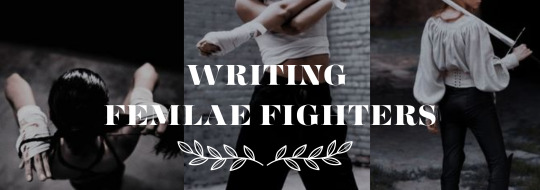
Writing Female Fighters
The Heroine Must. Fight.
Today's female protagonists cannot sit on the side crying and breaking down or whimpering as the battle ensues.
Readers want to see autonomous female fighters who can at least defense themselves with courage and adequate skill.
Not all women are the same, but the heroine should get her butt moving.
Less Muscle, but More Flexibilty
The average woman is shorter than the average man, which makes it more difficult to wield a long sword or slam something down on the opponent's head.
A woman who works out can plausibly be stronger than a male couch potato, but if her male counterpart works out as much as her, the man is going to be much stronger.
On the other hand, the center of gravity in a woman's body is lower than a man's which makes it harder to knock her off her feet.
She is also more flexible, which gives her advantage in grappling fights, making use of complex landscapes, or deflecting blows.
A woman's small size can also be an advantage if her opponent has only ever trained with male opponents. His big hands might not get a good grip on her slender limbs.
In historical fiction, giving your heroine good muscule build can be tricky as exercise was generally considered harmful for women, with some exceptions for horseriding any maybe archery at best.
In such cases, make your heroine an accomplished dancer or an eager horsewoman, or the only girl whose father considered to be son replacement and thus, gave her a boy's education.
Women of lower classes who couldn't afford to be fashionably weak will be plausibly stronger, perhaps even more than an idle gentleman.
More Room for Negotiation, but Prolonged Ruthlessness
In the Suspense part of your fight scene, females are more likely to negotiate and talk more, strategically trying to descalate the situation rather than attacking on a momentary impulse.
Generally, women are less aggressive than men and remain level-headed longer than her male counterparts, opting for non-violent methods first before using force.
Exceptions apply if she is trying to protect her children (or someone who she cares for as a child). Mothers can be tigresses.
A female pre-fight conversation may be:
"If you had not done so-and-so and betrayed me with so-and-so, we could have been good friends as I thought we would be."
"What do you mean? It was in fact you who brought bad blood between us. I can still hear you laughing with so-and-so, taunting me, purposefully making me look bad -"
"But that was so long ago! If you want me to say sorry about something so insignificant, you should have just said so: I'm sorry. There. Satisfied?"
"Ha! I can't believe you say that so easily. You still don't get it, do you?"
"Who's being petty and unreasonable now?"
A male pre-fight conversation will be shorter:
"Who's the coward now?"
"You're wrong."
"Prove it."
"Bastard."
Compared to men, it will take more time for a woman's fight hormones (adrenaline, neurotransmitters and such) to kick in.
She would be slower to engage initially, throwing reluctant punches and thinking, but she'll grow more and more violent and lose all rational thought and compassion, and once she's in full flow, may not stop even when her opponent begs for mercy.
When writing a male-female duo, you can show him going for the first blow while she observes and strategizes first. When he's past his peak and panting, she is flying about left and right. Later when the tension wears off and she becomes wobbly and teary, she can rely on him to have recovered faster and distract other teammates so that they won't see her cry.
Plausible Skills and Backstory
In many cultures and time periods, the general attitude of society towards girls is that they have no place in fist fights or martial arts, unlike how it is encouraged for boys of the same age. So if your heroine has physical prowess that surpasses typical 'fitness' or is hidden, build a backstory of how she's obtained it.
For modern heroines, it can be as simple as signing her up for martial arts classes or yearly membership at the local gym. For historical fiction or girls with strict 'feminine' upbringing, it can be trickier.
It can be related to profession: maybe she was an erotic wrestler, catfighter, or an assasin who thought killing was more honorable than prostitution. They may have dabbles with it for a short time and is now trying to hide their past from their respectable employer or fiance.
It can be family backstory: Perhaps her mother was an accomplished martial artist or she had to fend for younger siblings on the streets from an early age. Maybe she was the only girl in a family of many boys who refused to be the punching bag.
Inexperienced Female Fighters
A woman with no fighting experience or training is likely to resort to one of these on instinct:
Try to talk herself out of the situation, attempting to persuade or negotiate for her life.
Grab something to use as a weapon. This instinct seems to be stronger for women than it is in men.
Use her hands to try and break free, or kick (often wth little success)
Pull hair
Scratch.
In a serious fight, pulling hair and scratching won't be helpful, except when the police come to find her body, they would find the opponent's DNA under her fingernails.
Plausible Weapons and Clothing
All of the above applies to scenes where both parties have no weapons, or has the bare minimum (like one dagger each).
Weapons are equalizers, and if your heroine is pointing a gun at her opponent she will definitely NOT hesitate to be the one to shoot first.
When giving your female character a weapon, choose one she can plausibly use. It would take an unusually brawny woman to wield a great medieval longsword.
For historical fiction, give your heroine something she'll plausibly own. Swords and firearm were a no-go for women, but archery was borderline acceptable.
For clothing starters, you definitely CAN NOT dress her in a tight miniskirt and chainmail bra with long, flowy hair and multiple silver chockers. Unless she's trying to seduce her way into her opponent's bedroom, and he has a chainmail bra fetish.
A practical heroine will have her thighs covered, preferably with leather but at least with fabric, since a lot of blood flows through the thighs and a slash would be critical.
She'll keep her hair tied, tucked under a helmet, braided back, etc. so that it won't impede her vision.
She'll support her breasts with a strong sport bra. In a historical eprioid, she'll either tie her breasts tight with a fabric bandage or support them with some kind of leather corset.
Invent a female version of male fighter clothing of the time you are writing about if it doesn't exist.
If you like my blog, buy me a coffee☕ and find me on instagram! 📸
#writing#writers on tumblr#helping writers#creative writing#let's write#poets and writers#writeblr#writers and poets#resources for writers#creative writers#fight scene#female fighter#female warrior#writer on tumblr#writer community#writer stuff#writer things#writer problems#writing process#writing prompt#writing inspiration#writing advice#writing ideas#writing community#on writing#writer#writerscommunity
526 notes
·
View notes
Text
the way I have heard so many talented fanfic writers say they started writing because they read someone else's fanfics that are so good they inspired them into becoming writers too? just proved my point that your writing is never 'in vain', even if you dislike it and think it could've been better, it's still good enough for someone out there that it becomes their source of inspiration and perhaps happiness. you'll never know.
but don't ever, ever belittle your own works. just because you don't like them, doesn't mean other people dislike them too. again, you'll never know. there could be someone out there who reread your works every day because those fics you wrote helped them escape reality for a while, they could be reading your works as a way to help get them through a hard time in their life. you'll never know.
your writing may have saved someone's life.
your writing may have inspired someone into pursuing their career and changing their life for the better.
several best selling authors started as fanfic writers, and the majority of fanfic writers started writing because they were inspired by someone's fanfics. you do the math.
your "silly fics" have permanent impact on this world, even if you think they're not good (they actually are good, I promise you, don't let your mind lie to you).
I mean ***I*** personally started writing my first fanfic about 7 years ago, and have been writing ever since, because I was inspired by my favorite fanfic writers. I still remember all the lines I like from those fics I read 7-8 years ago, I still think about those fics I read from 7-8 years ago and still remember the stories very well in my heart. I started writing because of them.
this blog would never have been created at all, if it weren't because of those fanfic writers whose works I read 7-8 years ago.
I wouldn't have so far written about 130,000 words this year alone, if it weren't because of those fanfic writers whose works I read 7-8 years ago.
to all the fanfic writers out there; your works inspired someone, your writing made a difference to someone's life.
#writing positivity#writer#writers#writeblr#ao3#archive of our own#writing#whump#whumpblr#writing inspo#writing inspiration#writing challenge#angst#fanfic#fanfiction#blorbo#comfort character#fandom#fandoms#writing tropes#tropes#writing trope#trope#whump tropes#prompts#prompt
564 notes
·
View notes
Text
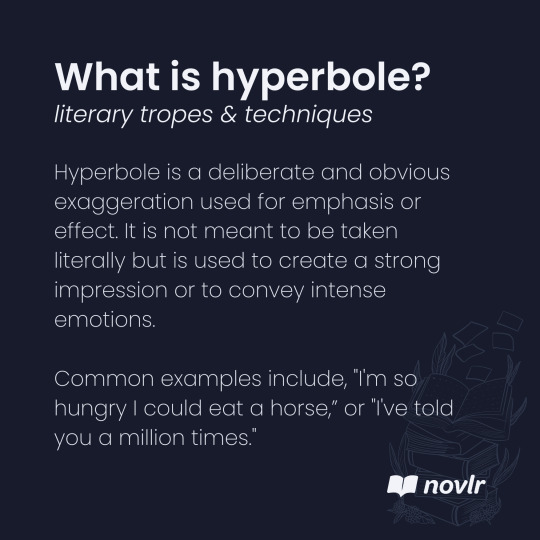
#literary devices#writing terms#writing tropes#writers#creative writing#writing#writing community#writers of tumblr#creative writers#writing inspiration#writeblr#writerblr#writing tips#about writing#writing stuff#tropes#literary terms#literary techniques#literary device#let's write#how to write#helping writers#writer#writers on tumblr#writing advice#writing resources#writers and poets#writing help#help for writers#tips for writers
644 notes
·
View notes
Text
#dnd5e#pizza tower#ufo#humans are space australians#dank memes#permanent slave#mobius#writer#bbc sherlock#kat von d#anais nin#mathematics#french bulldog
148 notes
·
View notes
Text
Some days as a writer are hard, since my head always spins stories and some stories even hurt me. It is strange to think about something, a story involving in your head which is bittersweet and does not have a happy ending. My most recent little idea was the following:
Imagine you promise your vampiric lover to return to him. Both of you swore eternal love. But you died in his arms before you could be turned. You promised to find him in your next life.
To your own surprise, you wake up 200 years later and even find your lover. But you learn about his new partner; your lover turned them. They swore eternal love and are happy. You suddenly feel worthless, unloved, a faded memory. How cruel would it be to interrupt their luck? How selfish would it be to make him choose? And even if you were to make him choose, who says he will actually choose you and not his new love? So, what do you do now? What is your purpose anymore?
#vampire smut#vampires#vampire x reader#vampire#monster boyfriend#monster lover#monster romance#monsterlover#monster bf#writer#mdni
92 notes
·
View notes
Text
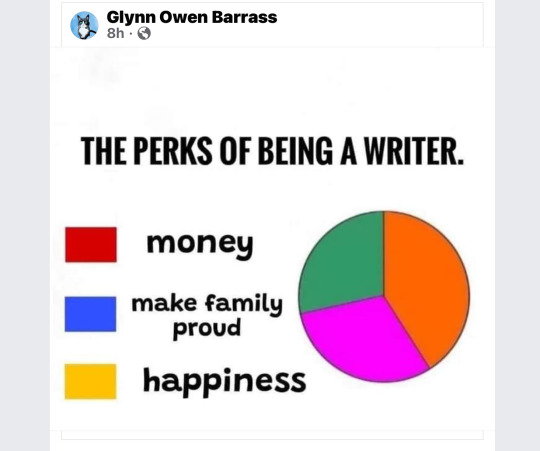
#writer#writeblr#writing tips#writing tips and tricks#writing help#writing tip#writing#writing advice#fanfic#writing reference
88 notes
·
View notes
Text
i will never forget
to
say it:
i love you all
and i hope, even if
you might not see
these words,
you know;
i will always
be here for you.
"interwoven."
d.b.a
#excerpt from a book i'll never write#excerpt from a story i'll never write#spilled words#spilled thoughts#excerpts from my life#journal#tumblr writers#tumblr authors#spilled poetry#spilled ink#poem#poems#poet#poets#poetic#poetry#lit#literature#writer#writers#writing#spilled writing#creative writing#poeticstories#poets on tumblr#poems on tumblr#writerscreed#writerscommunity#prose#writeblr
72 notes
·
View notes
Quote
Your eyes are an Ocean!
Avijeet Das
#quotes#Avijeet Das#thepersonalwords#literature#life quotes#prose#lit#spilled ink#eyes-quotes#life-quotes#love-quotes#ocean-quotes#poetry#writer
64 notes
·
View notes
Text
A Deep Dive into JKR's Terrible, Amateur Writing - Part Two
Welcome to my ballsy series where I will prove to you, dear reader, that J.K. Rowling, author of the Harry Potter series and resident Twitter TERF, is actually a very, very poor writer.
And when I say ‘poor writer,’ I’m talking about her prose, her sentence structure, and her scenes. I am not going to discuss anything about the HP world nor the overall plot of the books.
This is all about the nitty gritty in the craft of writing itself.
Part One Link.
Disclaimer for all readers of this series:
I’m going to sound very confident in my posts where I work under the assumption I’m a better writer than JKR; because I am. My apologies if this rubs you the wrong way. You’re simply witnessing the culmination of over two and half decades of experience with the intensity from a neurodivergent who is hyperfocused on her special interest. I didn’t just learn how to create stories; I learned the craft of writing to a minutia of details.
I’m not a perfect writer. No one is. I’m not a talented writer either. I’m experienced and skilled through years of study and practice.
I don’t care about J.K. Rowling. At all.
If you’re triggered by the concept and fact that JKR is a terrible crafter of writing, then you might want to take a step back and self reflect on that personal issue.
I still very much love and adore Harry Potter; you’re still allowed to love Harry Potter.
This is not a series to bitch or bash. This isn’t a shitpost. This isn’t an attack on JKR, no matter the disgusting bullshit she spews forth on Twitter. However, my hope is people awaken to the fact that JKR isn’t the goddess of writing we’ve all been led to believe.
This is a place of study and learning, where the purpose is to help students gain critical thinking skills and writing analysis tools to become better in their craft.
And, sorry, one more disclaimer for this specific post:
Fanfiction is written for fun and is posted for free. I put most of my effort into my main fanfic, Terrible, But Great. (Yes, I intend to update Moon Rite soon, too) However, I also have two fanfics that are cowritten with another author; thus, the style of Shall I Stay and Badger Prey are understandably different. I spend three to four times the hours to edit a chapter versus drafting it. My process for fanfiction: I draft. I do one expansion edit. I do one proofread edit. I post.
However, if I were to publish a novel where people are expected to drop money on said book, my work flow would be vastly more extensive. To be clear, I’d do all of the following myself. I would not outsource. My process for published novels: I would draft. I would do three to four expansion edits. I would do two to three cutting edits. I would do three proofread edits.
See the difference?
Because I don’t go through a cutting edit for my fanfiction, I’ll often come back later and see things I think are weak. I’m constantly seeing where I can tighten my work. There’s always room for improvement.
Remember: Harry Potter and the Order of the Phoenix is a paperback book that costs $10. My fanfics are free. If I, someone who writes for free and puts what she considers the bare minimum of effort into them, have a higher standard in the quality of my writing than a paid traditionally published novelist, there’s a problem here.
All right, with that nonsense out of the way, buckle up, my writing friends. Grab a snack. Hydrate. Remember to take what resonates and leave what doesn’t. Let’s begin.
Class is in session.
In this post, we’re going to discuss these five pages from HP5 and dissect one paragraph and a line from page 731. All dialogue is highlighted in blue.
(My favorite book in the series, btw. I fucking love fifth year the most. JKR did a damn good job with Umbridge.)
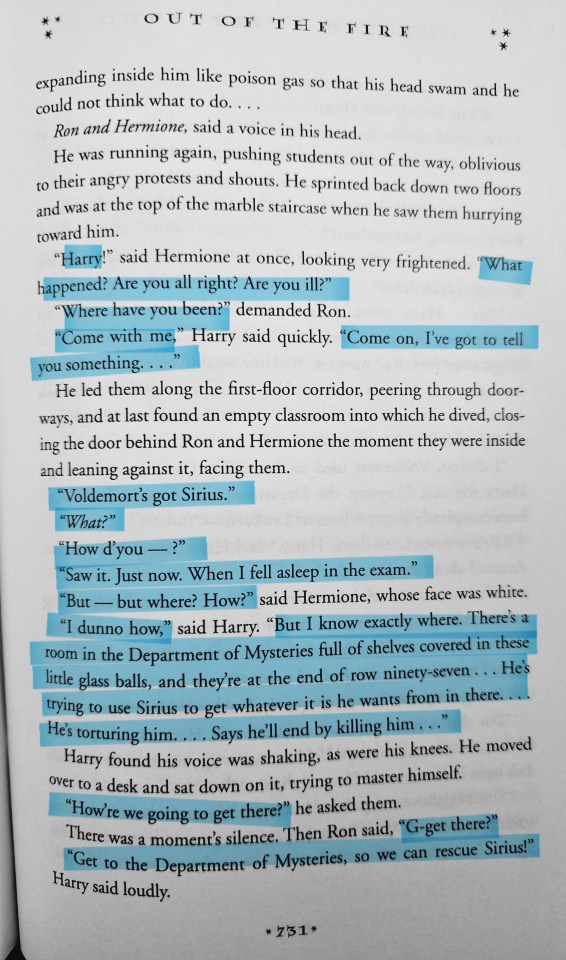
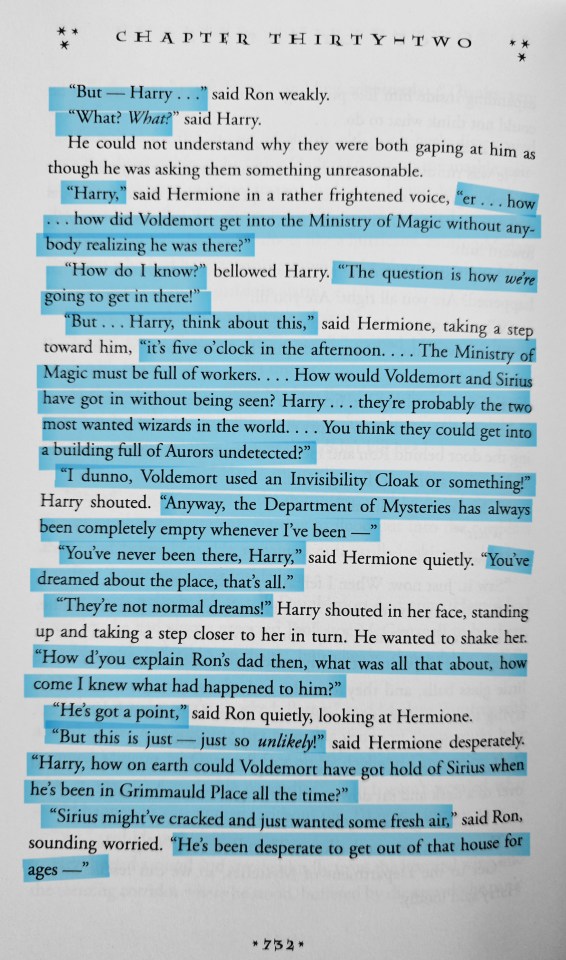
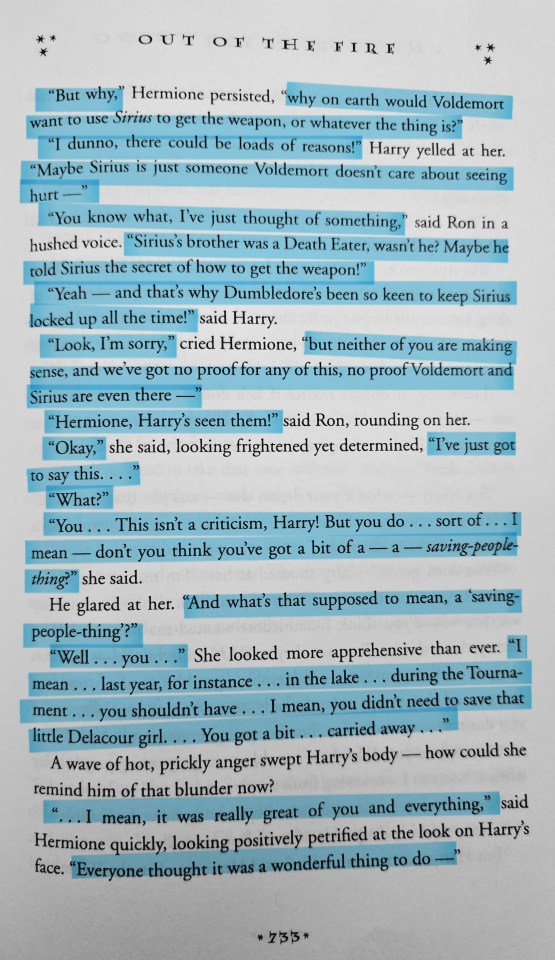
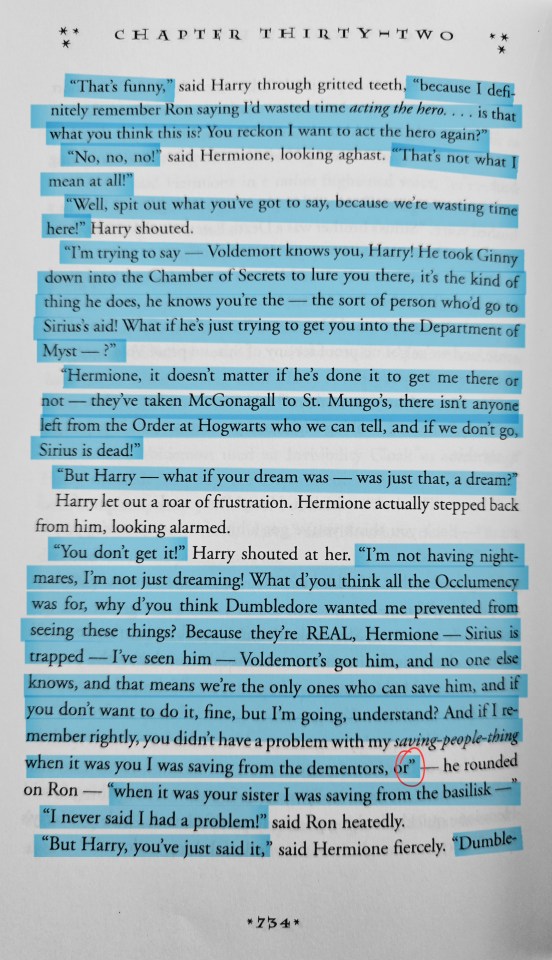
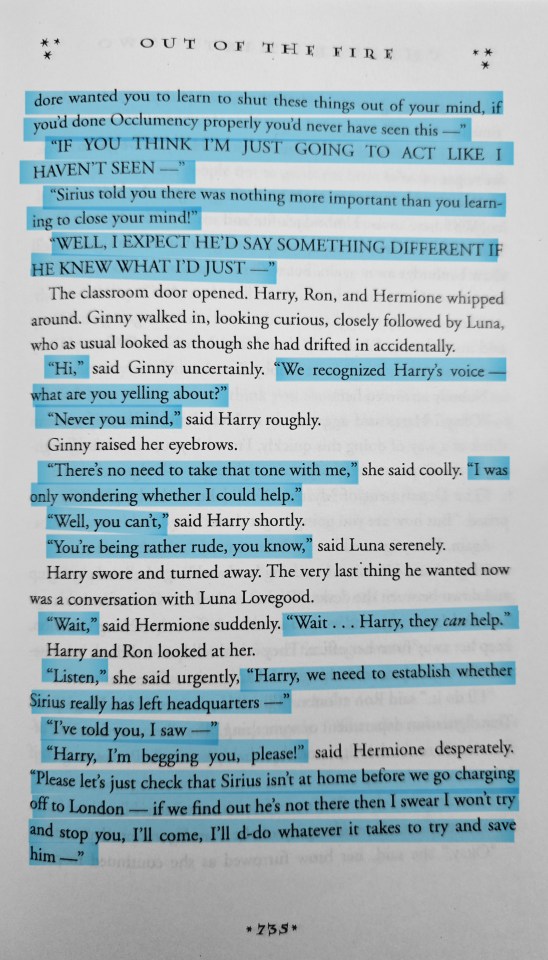
Since a certain anon lacked the skill to comprehend the difference between too much dialogue and stories driven by a high saturation of dialogue, let's go into further depth about dialogue.
What did I mean last week when I said: "Too much fucking dialogue!"
Today’s lesson will focus on the overall issue in JKR’s dialogue and in the prose surrounding those dialogue lines.
And since, apparently, I “lack the self awareness” to know most of my fics are “oversaturated with dialogue,” I’m going to use weaker examples of my own writing. Chapter 24 of TBG is heavily driven by dialogue with twenty-one named characters to juggle, something that's very difficult for me to manage. Though the chapter is lovely, I do feel it's some of my weaker work. In the end, I just didn’t have the energy to edit it a second time nor go through cutting edit.
Here are three different pages (some connected, some not) from Chapter 24 of Terrible, But Great. All dialogue is highlighted in blue.
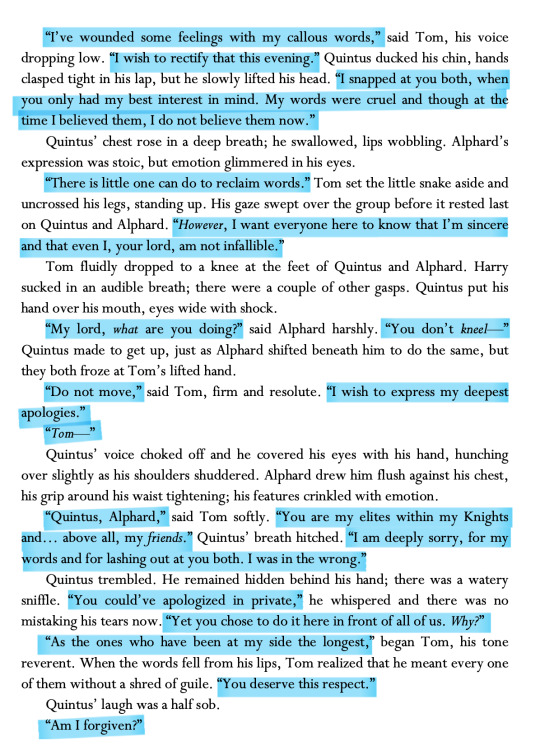
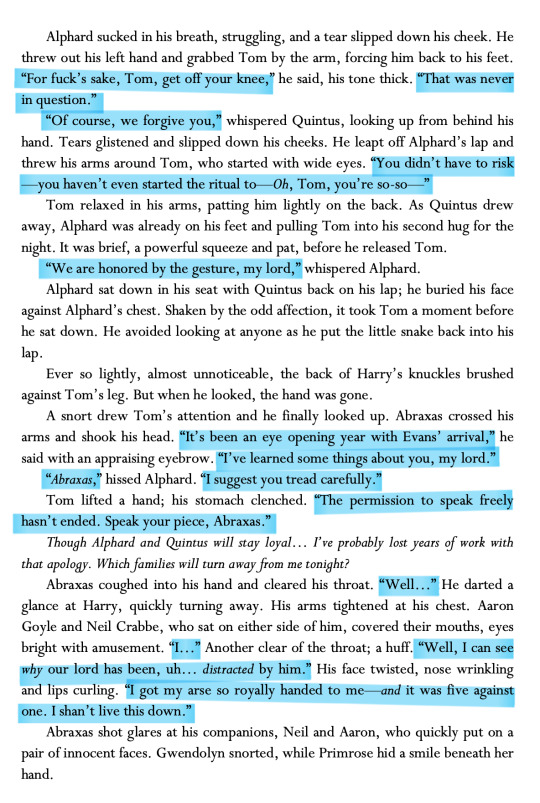
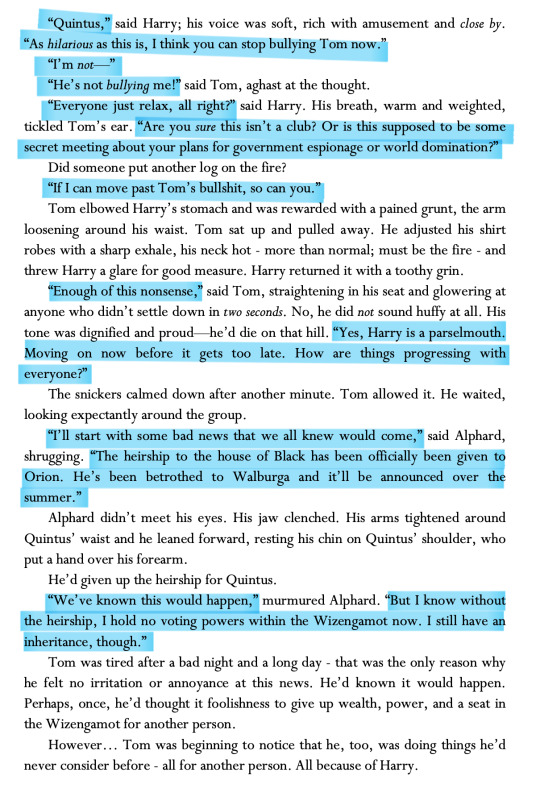
You can already see the difference, I'm sure.
So, what’s the difference between a scene that has 'too much fucking dialogue' versus a scene that is highly saturated with dialogue?
Because there is one.
Let's set the scene for HP5. In the middle of an OWL exam, Harry received a vision from Voldemort, showing him that Sirius has been captured. He's being tortured to get something from a shelf, but Sirius refuses. Harry believes the vision is real. He tells Ron and Hermione, then asks for their advice on how to rescue Sirius. Ron and Hermione are both like, pardon, wtf, sir? (As they should be.)
We have five pages of this fight between them. These five pages are mostly dialogue with very little else surrounding it.
Also, note the final page where it has the worst sins of adverb usage. That page is what triggered me to begin writing this series in the first place, btw.
There's too much dialogue here. There's no description. I'm being told stuff, but I'm not being shown anything. There are no emotional anchors to Harry either. The more I reread this scene, the more I realized what was wrong.
There’s an emotional disconnect from Harry in the prose.
Do not misunderstand me: it is NOT to say that Harry isn’t emotional here. It's that the prose doesn’t grip me, the reader, by the chest and twist my heart with his overwhelming emotions. The prose doesn't prove anything, doesn't show me anything. This is an intense, terrifying moment for Harry. It should feel visceral. It should feel tangible. I should be able to taste his fear.
We also don’t get too much information about the emotional states of Ron and Hermione. We have hints, of course. But we can’t feel them. The emotions of the scene are dampened, muffled, dull even.
With an untrained eye, you might disagree. It's okay. You'll see what I mean soon.
Page 731 exact quote:
"I dunno how," said Harry. "But I know exactly where. There's a room in the Department of Mysteries full of shelves covered in these little glass balls, and they're at the end of row ninety-seven...He's trying to use Sirius to get whatever it is he wants from in there....He's torturing him....Says he'll end by killing him..."
Harry found his voice shaking, as were his knees. He moved over to a desk and sat down on it, trying to master himself.
(Btw, punctuation issue: you do not use an ellipsis and a period together and there should be a space after the ellipsis.)
This is the only instance in the five pages where we get any information about Harry's physical state.
And it's written in such a weak 'telling' instead of 'showing' way, too.
How and where was his voice shaking? How are his knees shaking? Are they knocking together in a weird way that's kind of physically improbable? Or was it actually his legs were shaking? Isn't he leaning against the door? If his weight was resting against the door, then there'd be less shaking in his knees or legs because his knees would be locked to brace his body against the door. His arms and hands would be shaking, though.
How does Harry master himself? What does that look like? Slow breaths? Running a hand through his hair? Rubbing his face and eyes? How is Harry mastering himself? Is it mentally? Then, where are those mastering thoughts? What are they and why do those thoughts in particular help Harry 'master' himself?
What's Harry's tone as he talking about Voldemort threatening to kill Sirius? How is Harry feeling about this? Give me MORE!
The dialogue is presented to the reader in a bland, empty fashion. Harry is relating something to Ron and Hermione. I could switch the dialogue out with anything and it'd still make sense.
There is little surrounding the dialogue to anchor it.
So, let's rewrite this, shall we?
"I dunno how," said Harry, letting out a shaky breath. His hands clenched into fists against the door of the classroom. "But I know where—they're in a room in the Department of Mysteries that's filled with rows of shelves holding these... weird little glass balls. They're in row ninety-seven. Voldemort, he's—"
Harry's voice broke. His breath caught in his throat. The memory of the vision returned full force into his mind, the image of Sirius on the floor at Voldemort's feet stark in his mind. He ducked his chin; his chest inhaled in a desperate breath and the edges of his eyes burned.
He's torturing Sirius—I can't just wait around.
I can't lose him.
Harry looked up at Ron, whose face had grown pale, while Hermione stared at him with wide, terrified eyes. The strength in Harry's legs weakened.
"He needs Sirius to get whatever it is he wants and he's—" Harry sucked in a gasp, his voice trembling like an autumn leaf in a thunderstorm. "—he's torturing Sirius... says he'll kill him in the end."
His knees buckled. Harry stumbled to the nearest desk; Ron reached out with a steadying hand on Harry's upper arm and silent gratitude filled Harry's heart. With shaky arms, Harry lifted himself onto the desk to sit and twisted around to face Ron and Hermione. He licked his dry lips, rubbed his eyes with a hand, and took slow, deep breaths to master his fraying emotions.
The original canon text has 57 words of dialogue with a total of 83 words.
My rewritten version uses 56 words of dialogue with a total of 247 words.
I'm going to drill this concept into your heads, my lovely students: this is what I mean when I keep saying JKR's writing is both bloated and underwritten.
I only rewrote a single paragraph and its following line. The five pages I've provided are filled with this kind of empty dialogue.
So, what have I done here? Can you see the difference? Can you feel the difference?
Let's analyze what I focused on in this scene to show Harry's body language and his thoughts. I upped the physical effects on Harry's body. His fear causes his voice to break in the middle of explaining what's going on. He's terrified of losing Sirius, the only father figure he's ever known. Voldemort might take another parental figure from him.
And now the prose reflects these feelings, not just in his thoughts, but also in how he speaks and reacts to what is around him. He is not just speaking at the reader.
Harry exists in his world.
And you can feel it.
When he stumbles to the desk, Ron is there for him. Hermione reacting could also be added here. There is a lot that can be added to this scene, if one wanted to expand this further.
Yes, what I've done has increased the word count, yet it strengthens this short moment—and I'd do this for the entire scene.
What I did to the scene is merely one version of its potential. It could be rewritten in a multitude of ways and go in various directions. I spent 10mins to 20mins on it. I haven't edited it or refined it.
Can you finally see what I mean now?
If you compare the highlighted pages of HP5 to the highlighted pages of Chp 24 of TBG, you can visually see the difference in the density of the dialogue. JKR is the one whose writing is oversaturated with dialogue. My writing will always be highly saturated with dialogue because my stories are character driven. I prefer stories like that. But I also need the dialogue to be interesting and engaging, where the character feels alive in their world.
When I say there's too much dialogue, this scene is such a good example of this because Harry, Ron, and Hermione are all over the place in their interactions with each other. Yes, you want your characters to sound realistic, but you're also the author curating an experience for the reader.
There's a balancing tightrope act between having realistic dialogue and unnecessary dialogue.
There's a thin line between showing too much and telling too little.
Lastly, if I were to improve the overall scene, I would center the focus on Harry's desperation to rescue Sirius. As Ron and Hermione try to talk him out of it, where Hermione delivers that iconic line of 'you have a people saving thing,' I'd have Harry explode with something like this:
"You don't know what's it like! You both have your parents—I-I don't... You'd feel the same as me if it were either of your parents being tortured by Voldemort, yeah? I can't lose him—I can't lose Sirius."
I'm not bothering with description around it right now. I just wanted to give the baseline dialogue to show you the theme I'd carry through this scene. It's all about Sirius. It's all about the fear of losing him. It's about showing the emotion of the character and making the reader feel that deeply.
And that's what matters the most.
All right then.
We have come to an end of Part Two in this series. We have discussed fives pages in JKR's Harry Potter and the Order of the Phoenix. The pages in question are 731 - 735 should you wish to look it up and study the scene yourself.
And so, please do the world the greatest of favors and write better than J.K. Rowling. I promise, it's not that hard once you see the differences.
Until next time.
Isa
#harry potter#hp#fanfiction#fanfic#hp fanfic#hp fanfiction#harry potter discourse#harry potter books#jk rowling#fuck jkr#anti jkr#jk rowling is a terrible writer series by isalise#on writing#writing#writers#writer#author#authors#writing advice#writing stuff#becoming better at writing#writer stuff#writeblr#writers on tumblr#writers on ao3#writerscommunity#creative writing#JKR's Terrible Amateur Writing Series#writing help#writing resources
63 notes
·
View notes
Text
#humans are space australians#dank memes#permanent slave#mobius#writer#taz#bbc sherlock#edvin ryding#kat von d#anais nin#mathematics#french bulldog#big tiddy gf
125 notes
·
View notes
Text
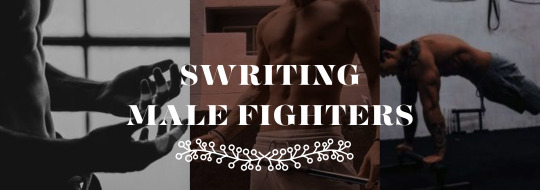
Writing Male Fighters
Body Language
Before they start fighting, they will communicate a lot through body language, either conscious or subconscious.
Standing with legs apart, elbows out to the side, shoulders aquared, chin thrust forward and up, hcest inflated and turned full front to his opponent, piercing stare. These cures are intended to make him bigger.
He may hook his hands into his belt, framing his genitals.
Subtly stretching his neck or spine.
Stepping close up to the other, invading the other person's personal space. The one who steps back will "lose" - when this happens, we know that fists will be flying soon.
Skills
When writing a scene from a male point of view, don't make the mistake of writing a detail about basic fighting skills (like landing a fist in the opponent's jaw). For a man (on average) who probably learnt to box in his playground days - it would be better to let the moves come naturally.
For fancier skills (like weapons handling or martial arts), you may explain in fuller detail so that your readers can follow what's happening.
Weapons
Men often have a special relationship with their weapon: very personal, almost intimate. The weapon may serve as a symbol of his power, masculinity and reflect his self-image, even.
The hero may be seen cleaning, repairing, oiling his weapon, bragging about it or comparing it with others'.
Men Against Women
Most men are reluctant to hurt a woman. This instinct is often hard-wired into them, even in martial arts school that pride themselves on gender equality.
While there is no biological reason for sparing a a female fighter - only the sense of good old chivalry - you can show your villain hesitate for a second or hit less hard when a see a woman coming for him.
If you like my blog, buy me a coffee☕ and find me on instagram! 📸
#writing#writers on tumblr#writers and poets#let's write#helping writers#poets and writers#writeblr#creative writing#creative writers#resources for writers#writing process#writing community#writing prompt#writing advice#writing ideas#writer#writerscommunity#writing inspiration#on writing#writer stuff#writer problems#writer on tumblr#writer things#writer community#author#writers block#writers community#writers life#male fighter#fight scene
259 notes
·
View notes
Text
WRITING RESOURCES
LIST OF INJURIES SOMEONE COULD OBTAIN IF THEY WERE SEXUALLY ASSAULTED
(trigger warning is applied.)
fractured pelvis (if their body was bent against a desk, a car, or something with hard surfaces)
ligature marks around their neck
bruises on their arms, thighs, legs
abrasions on their cheek (if their face was pressed against concrete floor)
urinary tract infection
blood in stool, blood in urine
lacerations around and/or inside the genitalia
#writing resources#writing#writer#whump#whumpblr#writers#writeblr#angst#whump prompts#whump prompt#writing prompts#writing prompt#whump tropes#whump trope#writing tropes#writing trope#prompts#prompt#tropes#trope
107 notes
·
View notes
Text
Not all consequences in storytelling must be negative
A consequence is simply something that happens because of an action or event.
So long as an action or event means something within the story, then there is no reason a consequence can’t be something good for your characters. As much as it can be tempting, we don't always need to torture them.
#writers#creative writing#writing#writing community#writers of tumblr#creative writers#writing inspiration#writeblr#writerblr#writing tips#tips for writers#helping writers#writer#writing advice#writing resources#writers on tumblr#writers and poets#let's write#quick writing tips#on writing#writer stuff
107 notes
·
View notes
Text
I honestly think the reason so many books sound and read the same these days is because of those “how to write books”. They’re just the same regurgitated 3-10 ‘rules’ over and over again…
Some are alright, like marketing your book, or character design to make them realistic, but some make me want to tear my hair out.
“This sells well therefore its a rule of writing” no no shut up no it’s not its just the trend for this year okay this plot will be boring after three books in slightly different font are published okay?
That’s not to discredit anyone’s writing, I mean you wrote a whole ass book and that’s amazing!! Good for you!! I’m genuinely so proud of you <3
But, I honestly don’t know if this is just me, but books all read the same now. I know when the reveal will happen, I know when the plot twist will be and I usually know what, I know exactly what the foreshadowing is 8/10 times and I know when itll be realised.
And I fully blame those “how to write books”, as almost every single one is the same 3-10 steps on how to write, when to write, what to write and how to write it.
Where’s the spark?
67 notes
·
View notes
Text
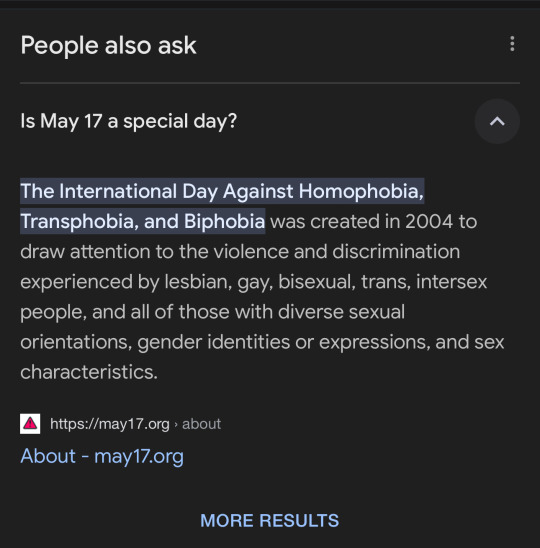
Happy International Day Against Homophobia, Transphobia, and Biphobia Everyone! 🥳🎉🎊
#transgender#trans pride#lesbian#gay#bisexual#intersex#lgbtqia#lgbtq community#lgbt pride#lgbtq#lgbtqiia+#lgbtqplus#🥳🎉🎊#writers community#fic writer#writer#cinderella boy
74 notes
·
View notes